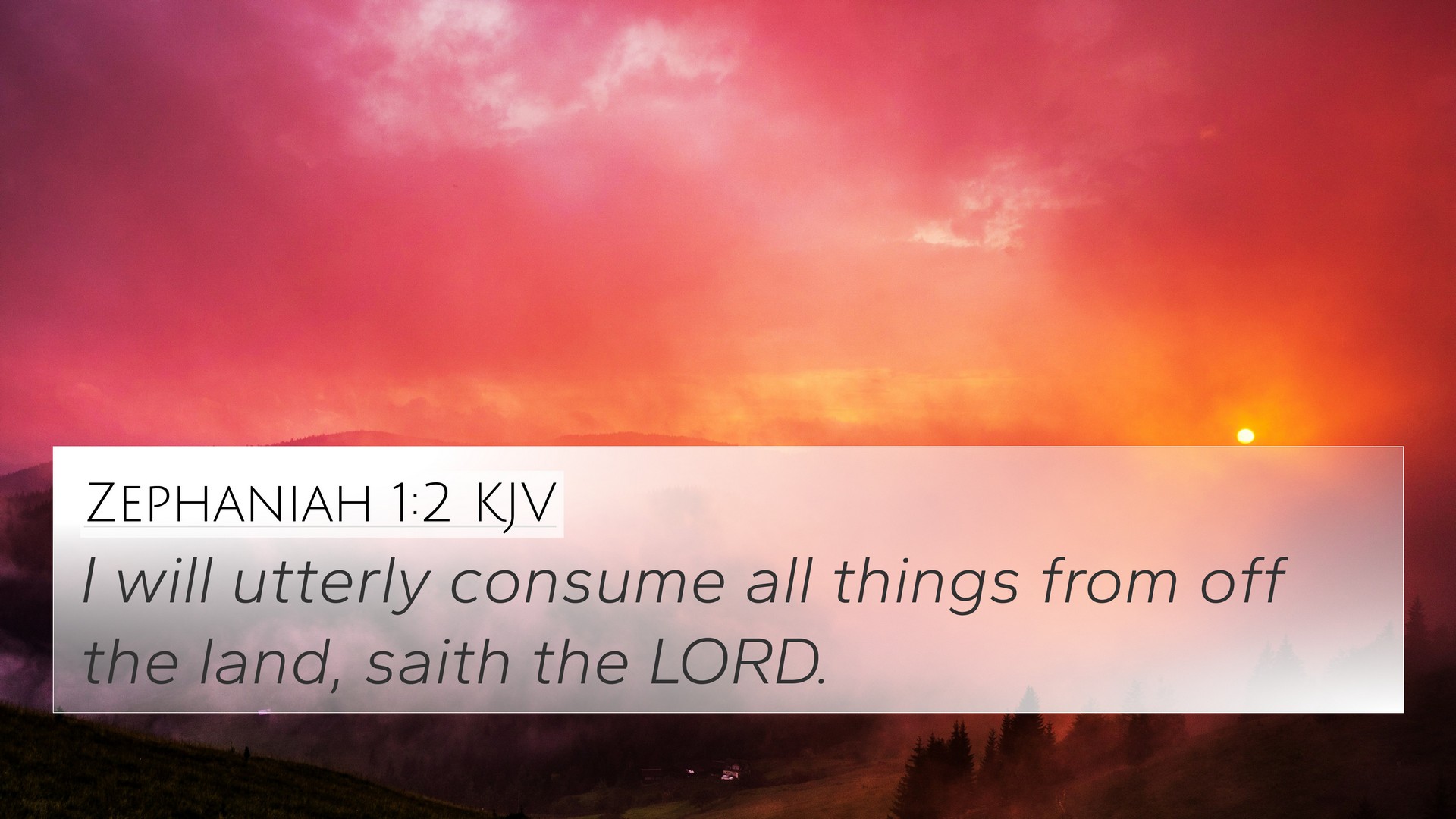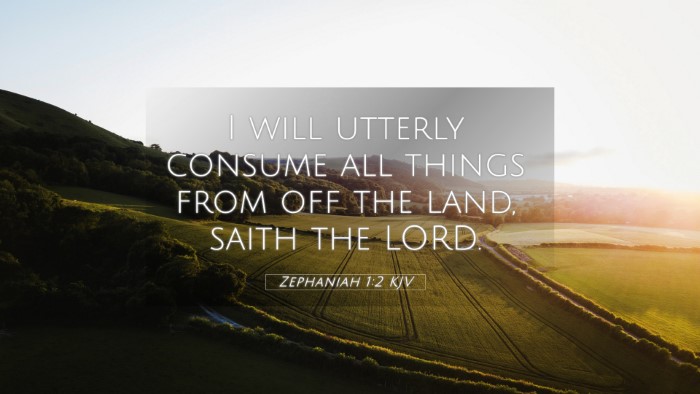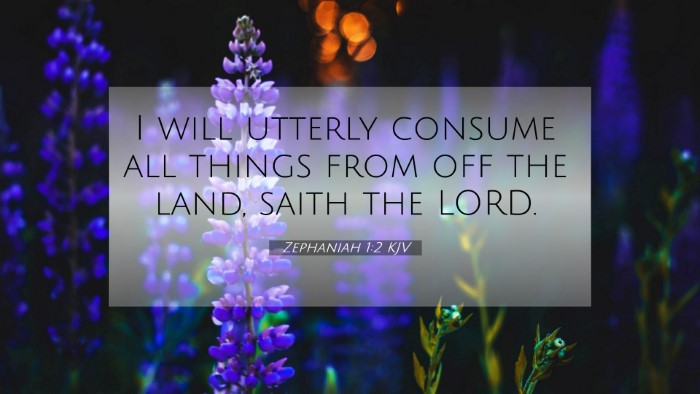Old Testament
Genesis Exodus Leviticus Numbers Deuteronomy Joshua Judges Ruth 1 Samuel 2 Samuel 1 Kings 2 Kings 1 Chronicles 2 Chronicles Ezra Nehemiah Esther Job Psalms Proverbs Ecclesiastes Song of Solomon Isaiah Jeremiah Lamentations Ezekiel Daniel Hosea Joel Amos Obadiah Jonah Micah Nahum Habakkuk Zephaniah Haggai Zechariah MalachiZephaniah 1:2 Similar Verses
Zephaniah 1:2 Cross References
I will utterly consume all things from off the land, saith the LORD.
Uncover the Rich Themes and Topics of This Bible Verse
Listed below are the Bible themes associated with Zephaniah 1:2. We invite you to explore each theme to gain deeper insights into the Scriptures.
Zephaniah 1:2 Cross Reference Verses
This section features a detailed cross-reference designed to enrich your understanding of the Scriptures. Below, you will find carefully selected verses that echo the themes and teachings related to Zephaniah 1:2 KJV. Click on any image to explore detailed analyses of related Bible verses and uncover deeper theological insights.
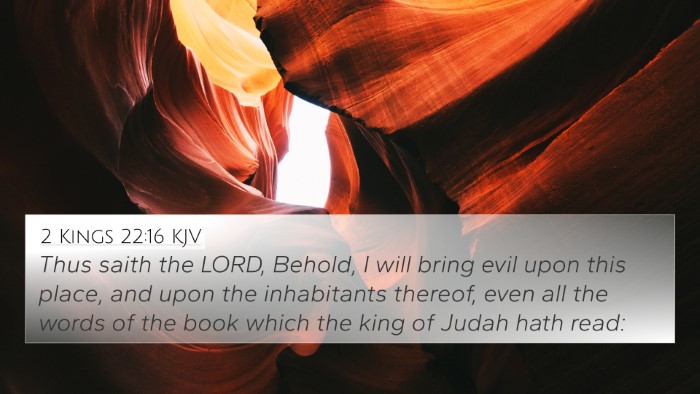
2 Kings 22:16 (KJV) »
Thus saith the LORD, Behold, I will bring evil upon this place, and upon the inhabitants thereof, even all the words of the book which the king of Judah hath read:
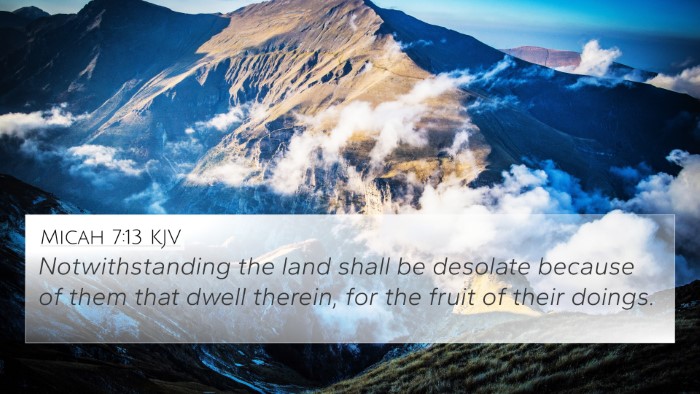
Micah 7:13 (KJV) »
Notwithstanding the land shall be desolate because of them that dwell therein, for the fruit of their doings.
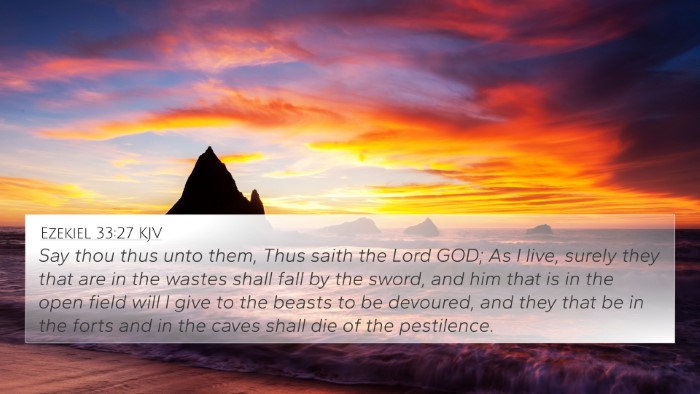
Ezekiel 33:27 (KJV) »
Say thou thus unto them, Thus saith the Lord GOD; As I live, surely they that are in the wastes shall fall by the sword, and him that is in the open field will I give to the beasts to be devoured, and they that be in the forts and in the caves shall die of the pestilence.
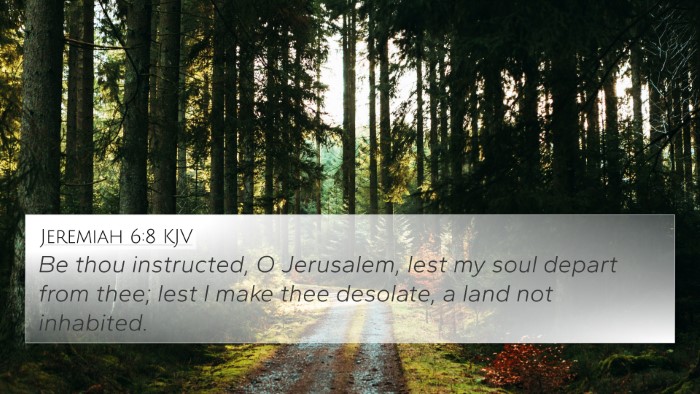
Jeremiah 6:8 (KJV) »
Be thou instructed, O Jerusalem, lest my soul depart from thee; lest I make thee desolate, a land not inhabited.
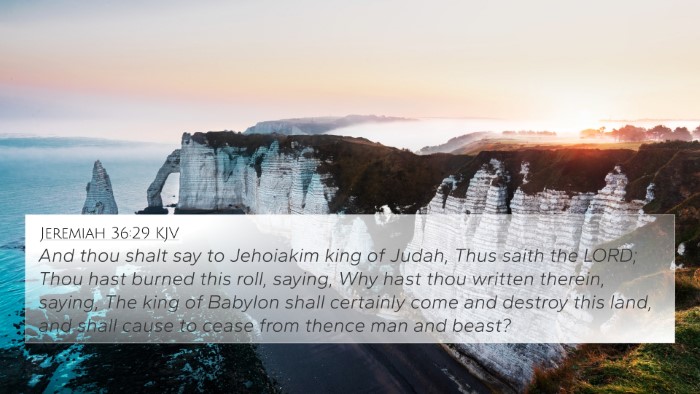
Jeremiah 36:29 (KJV) »
And thou shalt say to Jehoiakim king of Judah, Thus saith the LORD; Thou hast burned this roll, saying, Why hast thou written therein, saying, The king of Babylon shall certainly come and destroy this land, and shall cause to cease from thence man and beast?
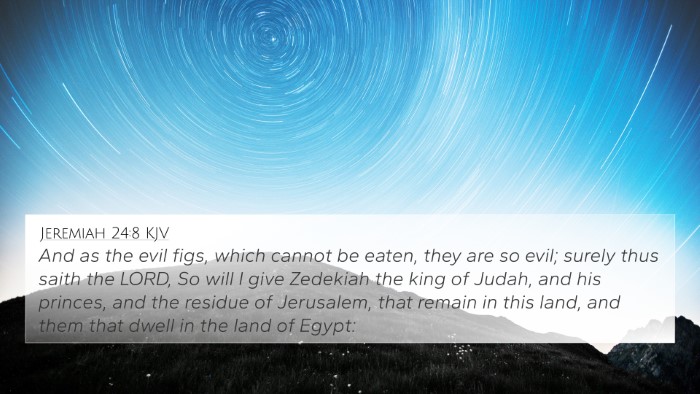
Jeremiah 24:8 (KJV) »
And as the evil figs, which cannot be eaten, they are so evil; surely thus saith the LORD, So will I give Zedekiah the king of Judah, and his princes, and the residue of Jerusalem, that remain in this land, and them that dwell in the land of Egypt:
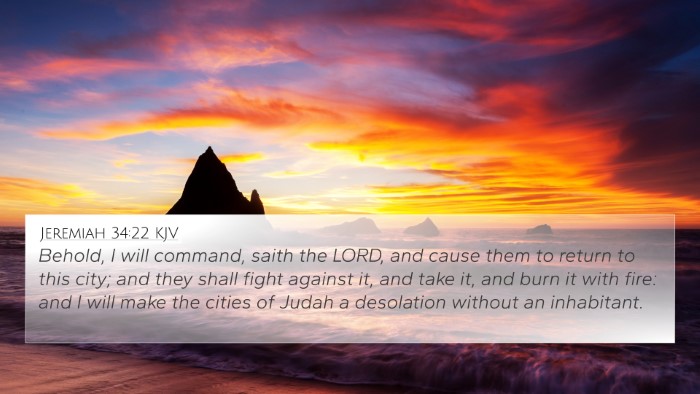
Jeremiah 34:22 (KJV) »
Behold, I will command, saith the LORD, and cause them to return to this city; and they shall fight against it, and take it, and burn it with fire: and I will make the cities of Judah a desolation without an inhabitant.
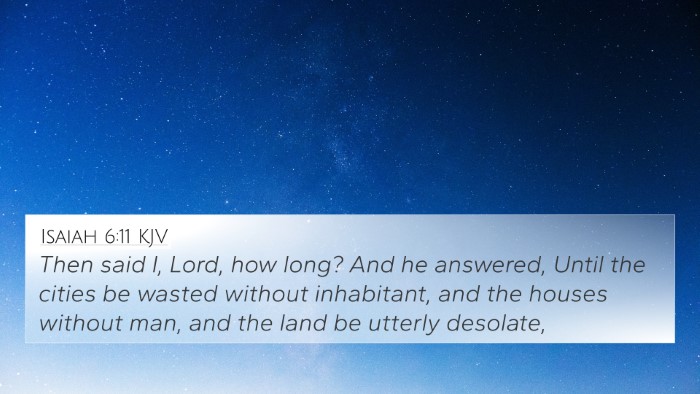
Isaiah 6:11 (KJV) »
Then said I, Lord, how long? And he answered, Until the cities be wasted without inhabitant, and the houses without man, and the land be utterly desolate,
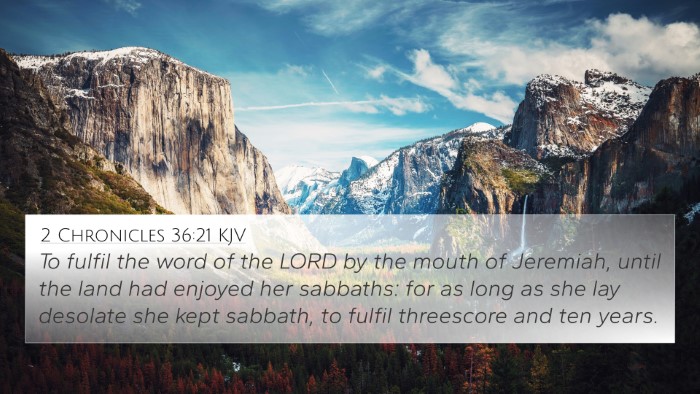
2 Chronicles 36:21 (KJV) »
To fulfil the word of the LORD by the mouth of Jeremiah, until the land had enjoyed her sabbaths: for as long as she lay desolate she kept sabbath, to fulfil threescore and ten years.
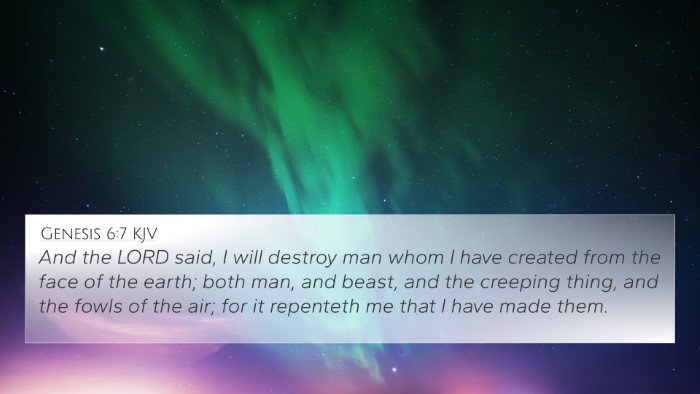
Genesis 6:7 (KJV) »
And the LORD said, I will destroy man whom I have created from the face of the earth; both man, and beast, and the creeping thing, and the fowls of the air; for it repenteth me that I have made them.
Zephaniah 1:2 Verse Analysis and Similar Verses
Understanding Zephaniah 1:2
Zephaniah 1:2 states, "I will utterly consume all things from off the land, saith the Lord." This verse is a powerful declaration of God's impending judgment and serves as a precursor to the broader themes of the Book of Zephaniah. The prophet Zephaniah delivers a message of warning and urgency to the people of Judah, indicating that a time of reckoning is approaching.
Commentary Insights
The insights from various public domain commentaries, including those by Matthew Henry, Albert Barnes, and Adam Clarke, provide depth in understanding this pivotal verse. Here are some key interpretations drawn from these sources:
- Divine Authority: Henry emphasizes the authority of God in this proclamation, pointing out that it is the Lord Himself who declares the intention to consume all things from the earth. This highlights God's sovereignty over creation and His power to execute judgment.
- Impending Judgment: Barnes elaborates that this verse signifies an imminent and comprehensive judgment against the wicked. It underscores God's righteousness and His intolerance of sin, preparing the reader for the call to repentance that follows in the text.
- Restoration Theme: Clarke interprets this destruction as necessary for eventual restoration. He notes that the removal of the corrupt and unrighteous will pave the way for a new beginning—one that aligns with God's ultimate plan for His people.
Cross-References and Connections
Zephaniah 1:2 finds various connections with other scripture passages that illustrate themes of judgment, divine authority, cleansing, and eventually restoration. Below are relevant cross-references:
- Isaiah 24:1: "Behold, the Lord maketh the earth empty, and maketh it waste, and turneth it upside down, and scattereth abroad the inhabitants thereof."
- Jeremiah 25:31: "A noise shall come even to the ends of the earth; for the Lord hath a controversy with the nations..."
- Ezekiel 30:3: "For the day is near, even the day of the Lord is near, a cloudy day; it shall be the time of the heathen."
- Joel 1:15: "Alas for the day! For the day of the Lord is at hand, and as a destruction from the Almighty shall it come."
- Malachi 4:1: "For, behold, the day cometh, that shall burn as an oven; and all the proud, yea, and all that do wickedly, shall be stubble..."
- Matthew 24:35: "Heaven and earth shall pass away, but my words shall not pass away."
- Revelation 21:1: "And I saw a new heaven and a new earth: for the first heaven and the first earth were passed away..."
Thematic Connections
The verse reflects significant theological themes present throughout the Scripture, such as:
- Judgment: The certainty of God's judgment is a theme echoed throughout both the Old and New Testaments, tying into the greater narrative of righteousness and justice.
- Restoration and Hope: The promise of hope following judgment is a recurring theme, where judgment is seen as a precursor to renewal and restoration, ultimately fulfilled in Christ.
- The Nature of God: This verse reveals attributes of God—His holiness, justice, and the seriousness with which He regards sin.
How to Use This Verse in Study
When using Zephaniah 1:2 in personal study or sermon preparation, consider the following methods:
- Engage in Bible cross-referencing by connecting this verse with parallel themes in other prophetic texts.
- Explore the context of Zephaniah's prophetic voice to gain insights into the spiritual state of Judah and the implications of God’s judgment.
- Utilize a Bible concordance to identify other verses that speak about God’s judgment and mercy, fulfilling a comparative study of Biblical texts.
- Employ thematic studies to identify how these verses reflect God's overarching story of redemption throughout Scripture.
Conclusion
Zephaniah 1:2 encapsulates a critical moment in the prophetic literature—one that calls for profound reflection on the nature of God, the reality of judgment, and the hope of restoration. By engaging with surrounding texts and utilizing tools for cross-referencing, believers can uncover the rich theological truths embedded in this prophetic declaration.
